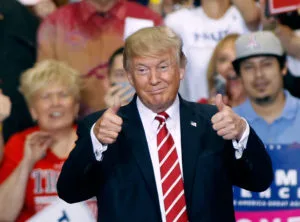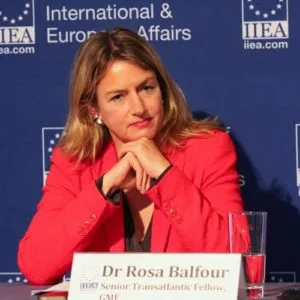Brussels – In the election year that will decide the balance of political forces in the European Union, EU institutions in Brussels must already begin to pay attention to and consider the implications of what might happen overseas. Because, in the run-up to the United States November 5 presidential election, Donald Trump seems to be ever more the favorite to take office in the White House (even though he is still not officially the nominee of the Republican Party). “There is starting to be awareness in the institutions and a growing conviction that a second term of Trump will not be like the first, but different, and focused on some specific goals,” the director of the Carnegie Europe think-tank, Rosa Balfour, explained to Eunews, outlining the potential risks for Europe.

Firstly, Balfour strongly emphasizes the need to consider that in case of a Trump victory, “there will not be the uncertainty of the initial period” of the first term in 2016. Seven years later, surrounding The Donald ,there is a ruling class “ready to work in the new administration with ideas” formulated by think tanks that are “pretty explicit, from international trade to Ukraine and NATO.” But among the most concerning issues, one should not forget the implications of the new president’s attitude once he takes office: “Trump will be very focused on personal revenge. It will be like a witch hunt against political opponents of the last few years, Democrats but also Republicans, and officials who prevented the overturning of the vote in 2020.” In other words, according to Carnegie Europe’s director, “the U.S. will be a democracy in danger, systematically, and seriously.”
Considering the domestic implications in the United States, it is inevitable to reason on the consequences for the European Union. “For Europeans, it means no longer being able to rely on the American system of checks and balances,” including having those “adults in the room” who, during the first Trump administration, made the most controversial dossiers disappear from the Oval Office. With the EU’s closest ally embarking on an “attempt to destroy democracy,” Balfour warns that also “the foreign policy agenda will also follow this path,” as will NATO membership. Although unilateral withdrawal by presidential decision has been made almost impossible (it takes a super-majority in the Senate or an act of Congress), it is equally true that the U.S. could “fail to meet some commitments, and so it would be the same as non-participation.” Similarly, one can consider the Ukrainian issue: “If Trump and Putin agree on peace, they will negotiate without consulting Ukrainian and European partners,” leaving not only Russia free to “continue to destabilize what remains of Ukraine” but also weakening the entire European policy of support for Ukraine “even if it maintained the required level,” the think tank director said.

Rosa Balfour
Concerns about a possible re-election of the former Republican president to the White House also spill over into the European camp. “Reasoning about how to prepare is not easy,” Balfour explains, “Partly because it is difficult to predict Trump, not having a clear ideology, and partly because Europeans do not share a vision of what an administration of his would entail.” The real risk is that of “political fragmentation, at the ideological level, but also the tactical level,” while the most predictable scenario is that of an increase in tariffs, which “would have a devastating impact on the European Union” and on the equilibrium with its closest partner (with whom no trade agreement is in force).
Politically, the danger is a split among the 27 Member States not into two factions but at least three. The first is the one that would push on the strategic autonomy of the Union – led by France – “although for now, it is an abstract idea, since on the defense front Europeans are buying weapons from the Americans.” The second is those who will try to “engage with Washington tactically,” namely the strongly pro-Atlantic countries such as Poland. And finally, the third group would be the pro-Trump governments and parties, “who might go their own way.” The Carnegie Europe director’s focus is not only on the Hungarian prime minister, Viktor Orbán – “hailed in the United States as a leader of the extreme right” – but also on Italian prime minister, Giorgia Meloni, who could find herself in big trouble because of her strong commitment to the Ukrainian front and strong Atlanticism, but the same ideological proximity to The Donald who would be unpredictable if re-elected to the White House in November.
English version by the Translation Service of Withub




